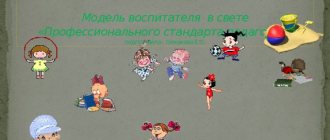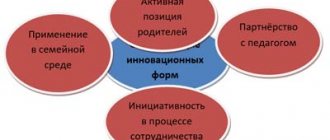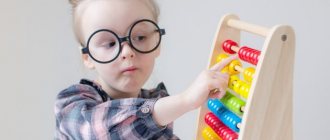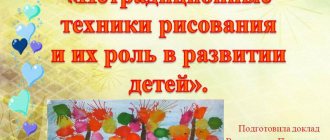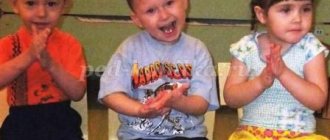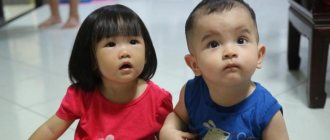Preparation for certification
Before the procedure is carried out, the applicant will have to collect a portfolio of a senior preschool teacher for certification, since its presence is one of the criteria for assessing his professional activities. A portfolio is an individual storage folder in which data and materials about the professional achievements of a teacher during the period between inspections are systematically collected. This period cannot be less than 36 months.
The senior teacher's analytical report for certification is in the form of structured tables placed on sheets of A4 paper. The columns of the tables are filled in personally by the applicant. The entire document consists of the following components:
- Title page with personal information.
- Self-analysis (self-test) of a senior preschool teacher for certification and self-assessment of the teacher’s professional work.
- Conclusions.
The finished portfolio is submitted to the certification commission along with a basic set of documents to pass the mandatory performance assessment. Each teacher should have such a folder ready once every five years. The exact timing of certification is determined by the commission.
An analytical note is also provided for a voluntary audit to improve the qualification category.
The portfolio must indicate the topic chosen for certification of the senior kindergarten teacher, as well as the content of the work. All documents in it must be signed by the head, and also have the seal of the educational institution where the applicant works.
Basic requirements for a teacher preparing for testing
To complete the procedure, you will need to provide the following documents:
- Application for certification.
- A copy of the certification sheet from the previous procedure (if available).
- Consent to the use of personal information.
- Portfolio (all materials prepared for testing).
The following requirements are imposed on a senior teacher applying for the first or highest category:
- Higher pedagogical education.
- Experience in teaching in the current position (at least three years).
- Completed advanced training courses (within the last five years).
- Participation in the methodological work of your locality and region.
- Conducting open methodological events for teaching staff.
- Experience in methodological guidance, documents for which are collected in a special folder.
- Be a mentor to senior educators just starting out in this position.
- Organization of innovative pedagogical activities in a children's educational institution at the place of work.
To pass the test, the teacher undergoes an interview with representatives of the certification commission, during which it is necessary to demonstrate good knowledge of the laws and regulations relating to the teaching and educational process, as well as an understanding of the general concept of education in preschool educational institutions. The applicant must have previous experience in teaching and education, as well as apply new advanced developments in the field of methodological work in a preschool institution.
To undergo the procedure, you must have a senior teacher’s reference for certification, which is issued and certified by the signature and seal of the head of the preschool educational institution. The teacher must competently organize methodological work in kindergarten, monitor the state of such activities, and also monitor and ensure the work of the methodological office in the preschool educational institution. His responsibilities also include methodological work with the teaching staff of the garden, training teachers in innovative methods of studying, accumulating and generalizing the accumulated experience for introducing it into the practical life of the institution.
Also, the applicant is required to organize and conduct pedagogical councils in kindergarten, help young specialists, supervise the work of experienced workers, organize events to improve the level of qualifications, as well as self-education. The senior teacher organizes interaction with the parents of students, as well as with various departmental and non-departmental institutions that take part in the life of the children's educational institution.
To complete the procedure, you need a document called “senior educator’s submission for certification.” This is an official document filled out by the head of the kindergarten, certified by her signature and seal of the preschool educational institution. It indicates the last name, first name and patronymic of the person being certified, the position held, as well as the purpose for which this document is being submitted. The submission contains a list of reasons due to which the applicant can confirm his qualifications or move to a higher level. This is as important a document as a full-fledged analytical report for passing the certification of a senior teacher.
Carrying out certification
Analysis and evaluation of the teacher’s performance is carried out according to the following important criteria:
- Knowledge of legislative and regulatory documents, orders and instructions of the Ministry of Education of the Russian Federation, regional and municipal educational authorities.
- Analysis of the pedagogical activities of a children's educational institution over the past twelve months.
- Program for further development of preschool educational institutions.
- Educational program used in kindergarten.
- Annual plan for working with teaching staff.
- Measures to protect the lives and improve the health of pupils and their physical development. These include knowledge and implementation of instructions on protecting the life and health of children in a children's educational institution.
- Monitoring compliance with the sanitary and hygienic regime of the kindergarten, including the implementation of new SanPiNs.
- Monitoring the progress and results of educational work with students of all ages.
- Coordination of full-fledged integrated activities of the teaching staff.
- Cooperation with parents in raising children and familiarizing themselves with the activities of the kindergarten.
- Organization and control of the functioning of the pedagogical council.
- Organization of the work of the methodological room.
- Selection of teaching aids, teaching materials, children's fiction, toys, and games, as well as organizing and maintaining a file cabinet of materials and aids.
- Transfer of best practices in pedagogical and methodological activities in your team, locality, district or region.
- Organization of work on interaction between kindergarten and primary school, as well as the development of forms and methods of such work.
- Organization and control of creative-exploratory or scientific-experimental work of a children's educational institution.
- Documentation related to the teaching activities of the senior educator.
Passing certification is an important stage in the professional life of every specialist.
Innovative methods of work of a senior educator with preschool teachers
Branch of MBDOU "Kindergarten No. 43" - "kindergarten "Kolosok"
Innovative methods of work of a senior educator with preschool teachers
Author: Anosova Tatyana Nikolaevna,
senior teacher
Slavgorod, 2020
“Give instructions only to those who seek knowledge. Provide help only to those who do not know how to clearly express their cherished thoughts. Train only those who are able, having learned about one corner of a square, to imagine the other three.”
Confucius
The concept of modernization of Russian education sets the task of achieving a new, modern quality of preschool education associated with the creation of conditions for the development of the child’s personality, capable of realizing himself as a part of society. In this regard, new content is expected for the professional and pedagogical activities of preschool teachers, their readiness to master and implement innovations that are in demand in the new educational situation.
The leading role in ensuring the effectiveness of the educational process is played by the teacher and his professionalism.
Increasing the level of skill of teachers is a priority area of methodological work, which occupies a special place in the management system of a preschool institution and represents an important link in the holistic system of advanced training of teaching staff, since, first of all, it contributes to the activation of the teacher’s personality and the development of his creative personality.
A constant connection between the content of methodological work and the results of teachers’ work ensures a continuous process of improving the professional skills of each educator. At the same time, methodological work is of a proactive nature and is responsible for the development and improvement of all work with children, in accordance with new achievements in pedagogical and psychological science. Therefore, it is impossible to agree with the understanding of methodological work as only a service for correcting errors in the activities of the educator, although in the course of it these problems also have to be solved. The main thing is to provide real, effective and timely assistance to teachers. However, the problem of improving the professional skills of each preschool teacher still remains one of the most difficult. It's no secret that sometimes a lot of effort is spent on organizing events, but the return is negligible. How can we explain all this? Thinking and reflecting on this matter, I came to the conclusion that traditional forms of methodological work, in which the main place was given to reports and speeches, have lost their importance due to their low efficiency and insufficient feedback. Today it is necessary to use new, active forms of work, which are characterized by the involvement of teachers in activities and dialogue, involving a free exchange of opinions.
To ensure the active participation of preschool teachers in innovative methodological work, it is necessary to design productive forms.
The set of necessary pedagogical conditions includes:
1. selection and examination (assessment)
innovative content of preschool education;
2. designing productive forms of methodological work that activate preschool teachers to improve professional competence.
Innovative methodological work is part of professional, managerial, pedagogical activities, the distinctive features of which are:
3. ensuring the operation of the educational institution in the development mode;
4. selection of the content of methodological work that ensures the personal development of a preschool child and his self-development;
5. providing teachers with information about innovative facts and phenomena and organizing expertise;
6. equipping teachers with methods of professional pedagogical activity that create an effective impact on the personal development of the child.
Methods and forms of enhancing innovative activities of teachers.
Currently, there is a problem of forming a teacher at an innovative preschool institution with competence, creativity, and readiness to use and create innovations.
Work to improve the professional skills of teachers should be allocated in a separate direction and adhere to the following basic requirements:
1. be practice-oriented;
2. integrate professional development and implementation of scientific research results and innovative teaching experience;
3. provide an individually differentiated approach that takes into account the capabilities of teachers and their professional interests;
4. promote the active development of knowledge and consolidation of professional skills;
5. evaluate the effectiveness of advanced training and make timely adjustments to this process;
6. provide a systematic and comprehensive approach to improving the professional skills of teachers.
Studying the activities and personality of a teacher is a necessary prerequisite for improving the quality and effectiveness of methodological work. Helping a teacher achieve high results in teaching and raising children is possible only if they comprehensively take into account not only the tasks of further improvement, but also the real capabilities of each teacher.
The selection of forms and methods of advanced training is determined by the psychological characteristics of the cognitive activity of adults. Therefore, the educational process is built taking into account the following requirements:
1. implementation of the variability of educational requests;
2. mastering methods of independent knowledge and transition to self-development mode;
3. orientation towards meeting the need for informal professional communication;
4. orientation towards self-analysis of one’s own activities and awareness of the need for its improvement;
5. problematic construction of the content of lectures and seminars, requiring interdisciplinary synthesis from teachers;
6. the use of such forms and methods of educational work that are of a research nature and aimed at understanding one’s own pedagogical experience and its creative processing.
Of the many forms and methods currently recommended for use in working with teachers, we can focus on some of them:
1. Seminar – creative classes are aimed at developing creative thinking and creating innovative projects.
2. Seminar - press conferences help to quickly find information on individual problems, deeply comprehend it, and discuss individual issues with colleagues.
3. Game simulation. Business and role-playing games involve modeling a real process, during which optimal professional decisions are made based on the analysis of artificially created pedagogical situations. A business game as a teaching method allows you to “get by”
one or another practical situation.
Such forms and methods as collective solution of problem situations, group discussion, or brainstorming are also used; trainings in small groups to improve professional skills; methods of self-educational work, scientific and practical conferences on the results of innovative activities of preschool educational institutions.
A new form that makes it possible to comprehensively solve basic practical and research problems and integrate various educational forms of training for teachers in an innovative institution is the scientific and methodological council. The work of the scientific and methodological council includes a creative group of teachers, the scientific director of the experimental site, the head of the preschool educational institution and a senior teacher.
The competence of his activities includes the creation of a team of like-minded people for the development of the institution, which develops a strategy, constructive and methodological schemes for the implementation of the general concept, a model of the institution and its main structures, methods for studying the cultural, educational and professional needs of all participants in the pedagogical process. An important place in the content of the work of the scientific and methodological council is occupied by the analysis of the activities of the institution, the results of the use of new pedagogical technologies, analysis of the professional activities of team members, consideration of prognostic programs and projects, analysis and approval of didactic and methodological materials, generalization of experience.
Important in the work of the scientific and methodological council is the analysis of innovative methods and techniques, and their implementation in the socio-cultural space, and the study of their influence on the degree of development of the child.
Thus, the use of these and other active forms and methods of teaching in the process of improving the professional skills of preschool teachers ensures the practice-oriented nature of the educational process, promotes inclusion in innovative activities, and the formation of the need for continuous professional improvement.
Improving the skills of teachers, replenishing their theoretical and practical knowledge is carried out through various forms of methodological work, namely using interactive forms and methods. The value of this approach is that it provides feedback, a frank exchange of opinions, and forms positive relationships between employees. The core of these forms of work with personnel are collective discussions, reasoning, argumentation of conclusions, competition of minds and talents. The importance of interactive methods is the achievement of such important goals as:
1. Stimulating interest and motivation for self-education;
2. Increasing the level of activity and independence;
3. Development of skills of analysis and reflection of one’s activities;
4. Development of the desire for cooperation and empathy.
What are the benefits of this job?
Firstly, the motivation for the professional activities of teachers, their social and cognitive activity increases significantly.
Secondly, those aspects of a person are realized that in everyday, rather monotonous life, do not find application or development.
Thirdly, experience of collective activity, mutual respect, support, cooperation is acquired, without which work in human society is impossible.
The level of methodological training of the teacher and his ability to improve professionally were studied using testing and questioning methods. What did it give?
Testing has shown that teachers experience difficulties in mastering new programs, organizing role-playing games, establishing person-centered interaction, and often cannot solve emerging problems.
The survey made it possible to identify methodological problems and difficulties that educators encounter during their work.
The work was built from simple to complex, logically, interactive forms corresponded to the content.
The main focus of interactive forms is to activate teachers, develop their creative thinking, and find a non-standard way out of a problematic situation.
The first effective interactive form introduced into work with preschool teachers is training (quick response, quick learning)
. Since modern life, with its numerous difficulties of both an economic and psychological nature, requires a person of any profession to exert all his moral and physical strength.
Teachers found themselves in the most difficult situation, since their work, even in stable times, was characterized by high emotional load and stress. A negatively colored psychological state of a teacher reduces the effectiveness of the process of raising and teaching children and increases conflict in relationships with colleagues, administration, and parents.
Pedagogical ring - orients teachers to study the latest research in psychology and pedagogy, methodological literature, helps to identify different approaches to solving pedagogical problems, improves the skills of logical thinking and argumentation of their position, teaches conciseness, clarity, accuracy of statements, develops resourcefulness, and a sense of humor. This form provides criteria for evaluating responses, speeches and actions of participants:
• general erudition;
• professional knowledge, abilities, skills;
• ability to get out of a difficult situation, impromptu.
For example, pedagogical ring: “Ways to improve the learning process in preschool educational institutions”
.
Every creatively working educator knows how often he is visited by wonderful ideas, sudden insights (eurekas), which, being unclaimed in a timely manner, are lost and forgotten. Whatever this happens, there is a discussion - this is a discussion-argument, a clash of different points of view, positions, approaches In pedagogical experience, compressed forms of discussions have become widespread, which include: round table “aquarium”
.
Its main task is to develop the skills to critically evaluate different approaches to solving specific issues in the practice of preschool educational institutions, the ability to defend one’s point of view with reason, and to create a culture of discussion. Topics for round tables can be different, but they must contain alternative elements in their formulation. For example, “Problems of interaction between public and family education at the present stage”, “Preschool educational institution - what should it be like?”
,
“The strength of the teacher’s .
What is she wearing? ,
“Ten Commandments of a Creative Personality.
Do you agree with them? .
A symposium is a discussion in which participants give presentations representing their points of view and then answer questions from the audience.
Debate is a discussion based on pre-arranged speeches by representatives of two opposing groups.
"Court hearing"
— a discussion simulating a trial
(hearing a case)
.
KVN, what? Where? When? Lucky case. It is successfully used to develop a quick reaction to changes in the pedagogical situation, the ability to find the optimal solution to a problem.
Pedagogical situations, impromptu - a method of activating pedagogical knowledge in the process of everyday communication, relationships with children, parents, and colleagues. For example, a child tells the teacher that mom and dad have separated, and he will now have a new dad. What might the teacher's reaction be?
Disadvantages of traditional forms of work (along with advantages)
is that not all educators act as active participants. Business games and other innovative forms of working with teaching staff help eliminate this shortcoming.
A business game can be used not only as a test lesson based on the results of a theoretical seminar on a problem that is relevant to a preschool educational institution, but also when developing solutions to a new problem. For example: “Is it easy to be a preschooler?”
A bank of ideas is a rational way of collectively solving problems that cannot be solved by traditional methods at this stage of a preschool educational institution. For example: “ Ecology of play : how to bring play back into the life of a kindergarten”
An effective form, in my opinion, is to hold an exhibition -
fairs of pedagogical ideas, auction. Well prepared and
carried out, it stimulates teachers to creativity and
self-education. Therefore, the main result of the exhibition-fair is
noticeable professional and personal growth of teachers. Thanks to
This form of work with teachers creates conditions for public
presenting the best examples of their professional activities,
the emergence of new ideas, the establishment and expansion of business and creative
contacts with colleagues.
Master Class. Its main goal is to get acquainted with teaching experience, the system of work, the author’s findings and everything that helped the teacher achieve the best results. The master class can be conducted both within the preschool educational institution and for teachers of the preschool educational institution of Kozhuun, the republic.
Creative hour “Gold Placers”
- work in small teams, where methodological recommendations are developed, models for analyzing a literary or musical work, a plan - schemes for searching for
a “treasure”
, new unconventional drawing techniques are being introduced.
Quality circles are organized at the initiative of the administration, taking into account the delegation of authority. The leading method is “brainstorming”
or
"brainstorming"
. A prerequisite for organizing a circle is the presence of a teacher who can teach colleagues without the help of the administration.
Pedagogical "atelier"
or a pedagogical workshop. Their goal: a master teacher introduces members of the teaching staff to the basic ideas of his educational system and practical recommendations for its implementation. Individual practical tasks are also being completed with a view to further use in working with children. For example: “Development of the creative imagination of a preschooler through the means of fiction, art activities, and experimentation.”
"Coaching session"
— interactive communication, developmental counseling, discussion
(question-answer)
.
“Do it for me”
principle practically does not work; here the teacher does not receive advice and recommendations, but only answers the questions that the consultant asks him, and he himself finds ways to solve problems.
In this process, individual support is provided to teachers who set themselves the task of professional and personal growth, increasing personal effectiveness. For example: “ Working with a certified teacher
. ”
When working in a team, it is important to know its psychological climate, the emotional state of teachers, and the level of professional and personal development. And I came up with the idea of creating a corporation that unites teachers by common interests - “Union of Like-Minded People”
. This is a corporation of kind, sociable, smart, sincere, organized, lucky. Examples of some events: super - bachelorette party, designer workshop, finest hour, mystical New Year, going to the theater, cinema, outing.
Another form that can be used before open events for educators in Kozhuun, the republic, and parents is the teacher’s mood for successful work - “Quick - setting”
:
1. If you want people to like you, smile! A smile, a ray of sunshine for the sad, an antidote created by nature from troubles.
2. You are the best and most beautiful, let all the fashion models in the world envy you.
3. There are people like a gold coin: the longer they work, the more
are more valuable.
4. There is no better beloved friend than your favorite job: she doesn’t get old, and
does not allow you to grow old.
5. Difficulties strengthen you on the path to happiness.
Conclusion
Improving the quality of preschool education is directly dependent on personnel. It is important to note that in modern conditions of education reform, the status of the teacher, his educational functions are radically changing, and the requirements for his professional and pedagogical competence and the level of his professionalism are changing accordingly. At the moment, we note that today there is a demand for a teacher who is creative, competent, and capable of developing the skills to mobilize his personal potential in the modern system of education and development of preschoolers.
A teacher of the 21st century is:
1. A harmoniously developed, internally rich personality, striving for spiritual, professional, general cultural and physical perfection;
2. Able to select the most effective methods, means and technologies of training and education for the implementation of assigned tasks;
3. Able to organize reflective activity;
4. Possessing a high degree of professional competence, a teacher must constantly improve his knowledge and skills, engage in self-education, and have a variety of interests.
To summarize, we can say that a well-constructed system of interactive forms of work with teaching staff will lead to an increase in the level of educational work of preschool educational institutions and will unite the team of teachers.
The main thing is to find the golden key for each teacher.
